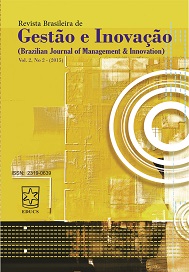Ensaio teórico sobre a OMC e as negociações internacionais
Keywords:
Comércio internacional, Organização Mundial do Comércio, Barreiras ao Comércio internacional e Legislação AntidumpingAbstract
Ao término da segunda guerra mundial os países passaram a adotar novas políticas de comércio internacional. A adoção de barreiras não-tarifárias começou a ser utilizada até por países adeptos do modelo liberal de comércio, com a função de administrar o sistema multilateral de comércio resultante da Rodada Uruguai (1986/93).Este ensaio teórico mostra as novas regras que balizam o comércio mundial, destacando os limites por elas colocados à definição das práticas comerciais nacionais e a importância das decisões políticas ao se adequarem sua retórica à nova realidade, faz-se uma breve reconstituição da evolução do sistema multilateral de comércio desde a criação do Acordo Geral de Tarifas e Comercio (General Agreement on Tariffs and Trade – GATT), em 1947, até a constituição da Organização Mundial do Comércio (OMC) em 1995; destaca as principais diferenças entre ambos, enfatiza a necessidade de os países em desenvolvimento abandonarem a postura defensiva que têm adotado com relação a certas questões e partirem para uma posição pró ativa e chama a atenção para o papel da OMC na nova ordem mundial. Da mesma forma, atenta as rodadas de negociações que culminaram para a criação da OMC; seu acordo constitutivo, os acordos correlatos e os princípios das práticas políticas econômicas restritivas tarifárias e não-tarifárias. Este estudo teórico também mostra a formação histórica do Sistema GATT-OMC, a estipulação de quotas para o comércio e a prática de dumping, as áreas de atuação da OMC, as práticas protecionistas e desleais no comércio internacional, as subvenções.
DOI: 10.18226/23190639.v2n2.05
Downloads
Published
How to Cite
Issue
Section
License
The author must guarantee that:
- there is full consensus among all the coauthors in approving the final version of the document and its submission for publication.
- the work is original, and when the work and/or words from other people were used, they were properly acknowledged.
Plagiarism in all of its forms constitutes an unethical publication behavior and is unacceptable. Revista Brasileira de Gestão e Inovação has the right to use software or any other method of plagiarism detection.
All manuscripts submitted to RBGI - Revista Brasileira de Gestão e Inovação go through plagiarism and self-plagiarism identification. Plagiarism identified during the evaluation process will result in the filing of the submission. In case plagiarism is identified in a manuscript published in the journal, the Editor-in-Chief will conduct a preliminary investigation and, if necessary, will make a retraction.
This journal, following the recommendations of the Open Source movement, provides full open access to its content. By doing this, the authors keep all of their rights allowing Revista Brasileira de Gestão e Inovação to publish and make its articles available to the whole community.
RBGI - Revista Brasileira de Gestão e Inovação content is licensed under a Creative Commons Attribution 4.0 International License.
Any user has the right to:
- Share - copy, download, print or redistribute the material in any medium or format, linking to RBGI site.
- Adapt - remix, transform and build upon the material for any purpose, even commercially.
According to the following terms:
- Attribution - You must give appropriate credit, provide a link to the license, and indicate if changes were made. You may do so in any reasonable manner, but not in any way that suggests the licensor endorses you or your use.
- No additional restrictions - You may not apply legal terms or technological measures that legally restrict others from doing anything that the license permits.
#RBGI







